#Ionic application services
Explore tagged Tumblr posts
Text
Best Ionic app development agency in UK
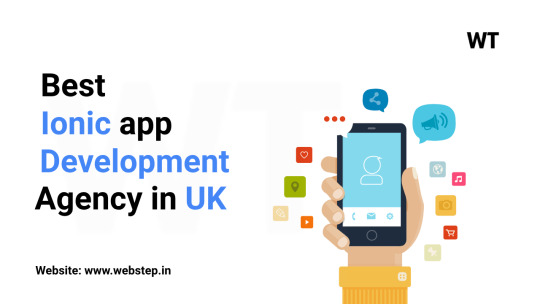
In the dynamic realm of mobile app development, finding the right partner can make all the difference between a successful venture and a missed opportunity. Amidst the myriad of choices in the UK market, one company shines as the beacon of excellence in Ionic app development — WEBSTEP. Renowned for its expertise, innovation, and commitment to quality, WEBSTEP has earned its reputation as the best Ionic app development agency in UK. In this comprehensive guide, we will delve into what sets WEBSTEP apart and why it’s the go-to choice for businesses seeking top-notch Ionic app solutions.
Why Ionic App Development? In the ever-evolving landscape of mobile app development, businesses are continually seeking innovative solutions to stay ahead of the curve and engage with their audience effectively. Among the plethora of options available, hybrid Ionic app development has emerged as a compelling choice for companies aiming to strike the perfect balance between efficiency and excellence. In this article, we’ll explore why Ionic app development is a game-changer in the world of mobile apps.
Cross-Platform Compatibility: One of the standout features of Ionic app development is its ability to create cross-platform applications that run seamlessly on multiple devices and operating systems. By leveraging web technologies like HTML, CSS, and JavaScript, Ionic allows developers to write code once and deploy it across various platforms, including iOS, Android, and the web. This cross-platform compatibility not only streamlines the development process but also maximizes the reach of the app, ensuring broader accessibility for users.
Native-Like User Experience: While hybrid apps traditionally struggled to match the performance and user experience of native applications, Ionic has changed the game with its native-like UI components and themes. With Ionic, developers can create apps that not only look but also feel like their native counterparts, thanks to a rich library of pre-designed UI elements and animations. This ensures a smooth and immersive user experience across different platforms, enhancing user satisfaction and retention.
Rapid Development: Time-to-market is critical in today’s fast-paced business environment, and Ionic excels in accelerating the app development process. By providing a comprehensive set of tools, plugins, and ready-made components, Ionic empowers developers to build feature-rich apps quickly and efficiently. Moreover, Ionic’s intuitive development environment and robust community support further streamline the development workflow, allowing businesses to launch their apps faster and gain a competitive edge in the market.
Cost-Effectiveness: In addition to speed, Ionic app development offers significant cost advantages compared to native app development. Since Ionic apps are built using web technologies, developers can leverage their existing skills and resources, eliminating the need for specialized knowledge or separate development teams for each platform. This results in lower development costs and faster ROI for businesses, making Ionic an attractive option for startups and small to medium-sized enterprises with budget constraints.
Scalability and Maintainability: As businesses grow and evolve, scalability and maintainability become paramount considerations for their mobile applications. Ionic’s modular architecture and built-in tools for testing, debugging, and performance optimization make it well-suited for scaling applications as demand increases. Furthermore, Ionic’s active community and regular updates ensure ongoing support and maintenance, keeping apps up-to-date and competitive in the long run.
In conclusion, WEBSTEP stands out as the best Ionic app development company in UK, offering businesses a simple yet effective solution to meet their mobile app needs. With a focus on simplicity and efficiency, WEBSTEP provides tailored Ionic app development services that empower businesses across various industries to succeed in today’s digital landscape. From enhancing customer engagement to streamlining operations and driving growth, WEBSTEP’s expertise in Ionic app development ensures that businesses can achieve their goals with ease.
#ionic app development#ionic app development company in UK#Ionic application services#ionic app developers#webstep#webstep technologies
1 note
·
View note
Text
Native vs. Hybrid Mobile App Development: Making the Right Choice
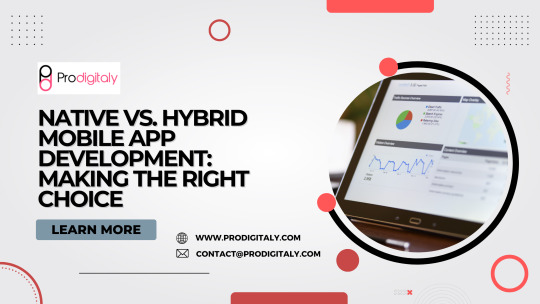
Introduction
In the rapidly evolving landscape of mobile technology, businesses are presented with a crucial decision when developing mobile applications: Should they opt for native app development or go the hybrid route? This decision significantly affects user experience, development cost, and time-to-market. This comprehensive guide will delve into the differences between native and hybrid mobile app development and help you make an informed choice for your project.
Understanding Native App Development
Native apps provide unparalleled performance and seamless integration with the device's hardware and software. They offer a superior user experience due to their responsiveness and access to platform-specific features. involves creating applications designed to run on a specific platform or operating system, such as iOS or Android. These apps are built using platform-specific programming languages like Swift for iOS and Java/Kotlin for Android. Native App Development
The Benefits of Native App Development
1. Performance:
Native apps are optimized for the specific platform they are developed for, resulting in better performance and smoother user interactions.
2. User Experience:
Native apps provide a consistent and intuitive user experience, adhering to the design guidelines of each platform. It contributes to higher user engagement and satisfaction.
3. Access to Device Features:
Native apps can leverage device-specific features like GPS, camera, and push notifications, enhancing the app's functionality.
4. Offline Functionality:
Native apps often function offline, allowing users to access certain features without an internet connection.
Challenges of Native App Development
1. Cost and Time:
Developing separate apps for different platforms can be time-consuming and expensive. It requires hiring specialized developers for each platform.
2. Updates:
Managing updates and bug fixes for multiple native apps can be challenging, especially if the development team is not well-equipped.
Understanding Hybrid App Development
Hybrid app development aims to create applications that run on multiple platforms using a single codebase. These apps are typically built using web technologies like HTML, CSS, and JavaScript, wrapped in a native container. This approach allows developers to write code once and deploy it across different platforms, saving time and resources.
The Benefits of Hybrid App Development
1. Cost-Efficiency:
Since a single codebase is used for multiple platforms, development costs are significantly lower than native app development.
2. Faster Development:
Building a hybrid app is shorter due to the reuse of code across platforms, resulting in quicker time-to-market.
3. More accessible Updates:
Updating a hybrid app involves changing the shared codebase, simplifying the process, and ensuring platform consistency.
4. Wide Reach:
Hybrid apps can reach a broader audience as they are compatible with iOS and Android devices.
Challenges of Hybrid App Development
1. Performance:
Hybrid apps sometimes lag behind native apps, especially for complex animations and intensive graphics.
2. Limited Access to Device Features:
While hybrid apps can access certain device features, they might not offer the same level of integration as native apps.
3. User Experience:
Due to platform-specific design guidelines and differences, achieving a seamless user experience across different platforms can be challenging.
Making the Right Choice
When deciding between native and hybrid mobile app development, consider the following factors:
1. App Complexity:
For complex apps that require intensive graphics or intricate interactions, native development might be more suitable.
2. Budget:
Hybrid development could be cost-effective if you have budget constraints and want to develop for both platforms.
3. Time-to-Market:
If speed is crucial, hybrid development can help you launch your app faster.
4. User Experience:
If delivering a seamless and platform-specific user experience is your priority, native development is the way forward.
5. Long-Term Goals:
Consider your app's long-term goals and the potential need for ongoing updates and improvements.
Finding the Right Mobile App Development Company
Whether you choose native or hybrid development, partnering with the right mobile app development company is crucial for success. Look for a company that specializes in both web and mobile app development. Consider their expertise in native and hybrid approaches, portfolio, client reviews, and ability to understand your project's unique requirements.
Conclusion
In the realm of mobile app development, choosing between native and hybrid approaches is a decision that requires careful consideration. Native apps offer unparalleled performance and user experience, while hybrid apps provide cost-efficiency and quicker development. Ultimately, the right choice depends on your project's complexity, budget, and goals. Whichever path you choose, collaborating with a reputable mobile app development company will ensure your project's success in the competitive app market.
#digital marketing company#application for android app development#digital marketing company in indore#facebook ad campaign#google ads management services#flutter app development company#facebook ad agency#ios app development company in india#ionic app development company#facebook ads expert
0 notes
Text
Transforming Businesses with DI Solutions: Innovative IT Expertise
Transform your business with DI Solutions

In the ever-evolving digital landscape, businesses must harness cutting-edge technology to remain competitive. At DI Solutions, we specialize in driving business transformation through advanced IT solutions and expert services. Our dedication to innovation and excellence has empowered numerous clients to achieve their goals and excel in their industries.
Innovative IT Solutions DI Solutions excels in providing tailored IT solutions that meet each client's unique needs. Our services include custom software development, mobile app creation, web development, and UI/UX design. By leveraging the latest technologies, we deliver state-of-the-art solutions that enhance growth and efficiency.
Expert Team of Professionals Our team consists of highly skilled professionals—creative designers, experienced developers, and strategic problem-solvers. We emphasize continuous learning to stay at the forefront of industry trends and technological advancements, ensuring that our clients receive the most effective and innovative solutions.
Global Reach and Impact
With over a decade of experience, DI Solutions has made a significant impact globally, partnering with more than 120 clients across North America, Europe, Asia, and Australia. Our extensive global presence demonstrates our capability to provide exceptional IT services that address diverse business needs.
Client-Centric Approach
At DI Solutions, clients are central to our mission. We take the time to understand their business objectives, challenges, and requirements, enabling us to deliver customized solutions that surpass expectations. Our client-centric approach ensures we provide not just what is needed but what drives success and growth.
Comprehensive IT Services
Our service offerings include:
Custom Software Development: Tailored software solutions for optimal efficiency and performance.
Mobile App Development: Innovative mobile applications for Android and iOS platforms.
Web Development: Expert web development to create responsive and user-friendly websites.
UI/UX Design: Engaging user interfaces that enhance the overall user experience.
Quality Assurance: Rigorous testing to ensure the highest quality standards.
DevOps Services: Streamlined operations through integrated cultural philosophies, practices, and tools.

Join Hands with DI Solutions
Partner with DI Solutions to harness the power of innovative IT expertise. Whether you’re a startup aiming to establish a presence or an established business seeking new heights, we have the solutions and expertise to propel you forward.
For more information, visit our website or contact us directly. Let’s embark on a journey of transformation and growth together.
Transform your business with DI Solutions – where innovation meets excellence.
Contact Us Website: https://disolutions.net/ Email: [email protected] , Call: 91-9904566590 , B-301, 307, 406 Apex Commercial Center, Varachha Road, Nr. Yash Plaza, Surat, Gujarat,India-395006.
youtube
#disolutions #DI Solutions #Hire Angular.js Developers #Hire React.js Developers #Hire Vue.js Developers #Hire UI/UX Developers #Hire .NET Developers #Hire Node.js Developers #Hire Laravel/PHP Developers #Hire Android Developers #Hire IOS Developers #Hire Ionic Developers #Hire React Native Developers #Hire Full Stack Developers #Hire MERN Stack Developers #Hire MEAN Stack Developers #Mobile App Development #Web Development #UI/UX Design #Quality Assurance #DevOps Services
2 notes
·
View notes
Text
Empowering Businesses with Ionic App Development Services
In the dynamic landscape of mobile app improvement, corporations are constantly in search of revolutionary solutions to interact with their target market efficaciously. With the proliferation of smartphones and tablets, having a sturdy mobile presence has come to be imperative for staying competitive in the present-day market. This is wherein Ionic app development businesses step in, imparting flexible and green solutions to build cross-platform cellular packages that captivate customers and power business increase.
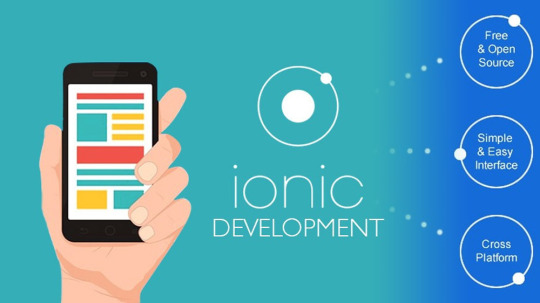
Unveiling the Power of Ionic App Development
Ionic is an open-source framework that lets builders build fantastic, function-wealthy cellular packages using internet technology which includes HTML, CSS, and JavaScript. Leveraging web technology permits Ionic app development companies to create go-platform programs that run seamlessly on diverse devices and working structures, consisting of iOS, Android, and the web.
1. Cross-Platform Compatibility:
One of the key advantages of Ionic app development is its potential to create cross-platform programs with a single codebase. This drastically reduces development time and costs, as developers can write as soon as possible and deploy throughout multiple systems, making sure of consistency in personal enjoyment throughout gadgets.
2. Native-Like Performance:
Despite being constructed with net technologies, Ionic packages offer native-like overall performance and responsiveness. Through technology like Capacitor or Cordova, Ionic apps can get the right of entry to device capabilities and APIs, turning in a continuing consumer experience with smooth animations, rapid loading instances, and fluid navigation.
3. Rapid Development Cycle:
Ionic's development environment is characterized by its simplicity and simplicity of use, facilitating a fast improvement cycle. With features like Ionic CLI (Command Line Interface) and Ionic DevApp, developers can streamline the development technique, iterate speedy, and take a look at their applications in actual time throughout multiple devices.
4. Extensive UI Component Library:
Ionic comes with a rich set of pre-designed UI additives and layouts, allowing builders to create visually attractive and intuitive personal interface results easily. From buttons and paperwork to navigation bars and modals, Ionic's UI thing library empowers builders to construct polished and expert-looking applications with minimal attempts.
5. Community Support and Ecosystem:
The Ionic framework boasts a colorful community of builders, designers, and lovers who actively contribute to its surroundings. From open-supply plugins and extensions to comprehensive documentation and tutorials, the Ionic network affords helpful resources and support, fostering collaboration and innovation in app development.
Industries Leveraging Ionic App Development Services
1. E-Commerce:
Ionic app improvement agencies cater to the growing desires of e-trade organizations through building characteristic-wealthy buying apps, inventory control structures, and customer engagement structures. These applications allow e-commerce manufacturers to supply seamless shopping reports, customized tips, and stable payment gateways to their clients.
2. Healthcare:
In the healthcare enterprise, Ionic apps are utilized to create telemedicine systems, patient portals, appointment scheduling structures, and health tracking programs. These apps enhance accessibility to healthcare services, facilitate remote consultations, and empower sufferers to manipulate their health correctly from their cell devices.
3. Education:
Educational establishments and e-gaining knowledge of structures leverage Ionic app improvement offerings to create interactive knowledge of apps, online course platforms, and educational video games. These applications guide far-off mastering, personalized education, and knowledge dissemination, catering to the numerous needs of college students and educators globally.
4. Finance:
Ionic apps are revolutionizing the finance zone by imparting answers together with cell banking apps, virtual wallets, and funding systems. With sturdy security features and seamless personal reports, Ionic-powered finance apps allow people to manage their budgets comfortably and securely on the go.
5. Travel and Hospitality:
Ionic app improvement businesses play an important position in growing travel reserving systems, inn reservation systems, and tour courses for the travel and hospitality industry. These programs provide intuitive interfaces, actual-time updates, and seamless booking reviews, enhancing the overall journey experience for users internationally.
Conclusion
Ionic app improvement organizations are at the leading edge of innovation within the cellular app improvement landscape, empowering organizations across diverse industries to construct compelling and function-rich packages that resonate with their target audience. With its cross-platform compatibility, native-like performance, and giant surroundings, Ionic offers a versatile and efficient framework for growing mobile applications that drive engagement, enhance the personal experience, and propel enterprise boom in the state-of-the-art virtual era.
2 notes
·
View notes
Text
Next Big Technology: A Leading Name Among Top App Development Companies
In the ever-evolving digital landscape, mobile applications have become the backbone of business success. With increasing demand, finding the right development partner is crucial. Next Big Technology (NBT) has established itself as a leading name among top app development companies, delivering innovative, user-centric, and result-driven mobile solutions for businesses worldwide.
Why Choose Next Big Technology?
As one of the top app development companies, Next Big Technology specializes in creating scalable, high-performance, and secure mobile applications tailored to meet diverse business needs. Here’s why NBT stands out:
Expertise Across Platforms
Proficient in iOS, Android, and Cross-Platform app development.
Expertise in using the latest frameworks like React Native, Flutter, and Xamarin.
Custom App Development Solutions
Tailor-made applications to meet specific business requirements.
Seamless integration with existing business infrastructure.
Innovative & Future-Ready Approach
AI & ML integration to enhance user experience.
AR/VR-enabled applications for interactive engagement.
IoT applications to connect devices seamlessly.
Robust Security & Compliance
Compliance with industry standards like GDPR, HIPAA, and PCI DSS.
End-to-end encryption and advanced security measures.
Services Offered by Next Big Technology
Being a reputed name in the top app development companies, Next Big Technology provides a wide range of app development services, including:
1. Mobile App Development
Native App Development (iOS & Android)
Hybrid App Development (React Native, Flutter, Ionic)
Progressive Web Apps (PWA)
2. Enterprise App Development
Business automation and process management applications.
Scalable solutions for enterprise needs.
3. E-commerce App Development
B2B & B2C eCommerce apps
Multi-vendor marketplace development
4. Game Development
2D & 3D game development
Unity & Unreal Engine-based game applications
5. On-Demand App Development
Ride-hailing, food delivery, healthcare, and home services apps
6. Web App Development
Custom web apps tailored to specific business needs.
Integration with mobile platforms for seamless user experience.
The Process Behind Next Big Technology’s Success
NBT follows a structured and agile approach to app development, ensuring high quality and efficiency:
Requirement Gathering & Analysis
Understanding business goals and user expectations.
Detailed documentation of project scope.
UI/UX Design
Crafting visually appealing and intuitive app designs.
Wireframing and prototyping for a seamless user experience.
Development & Testing
Agile development methodology to ensure flexibility.
Rigorous testing to eliminate bugs and ensure security.
Deployment & Maintenance
Launching applications on Google Play Store and Apple App Store.
Regular updates and maintenance for optimal performance.
Industries Served
NBT serves a variety of industries, making it one of the top app development companies catering to multiple sectors, including:
Healthcare & Fitness
E-commerce & Retail
Finance & Banking
Real Estate
Travel & Hospitality
Education & E-learning
Media & Entertainment
Conclusion
Choosing Next Big Technology means partnering with one of the top app development companies committed to delivering excellence. Whether you need a simple mobile app or a complex enterprise solution, NBT has the expertise and innovation to bring your vision to life.
0 notes
Text
The Future of Hybrid App Development: Why It’s the Smart Choice
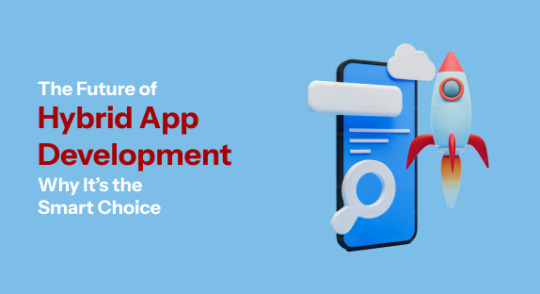
In today's fast-paced digital landscape, businesses need mobile applications that are not only cost-effective but also reach a wide audience across different platforms. Hybrid app development has emerged as a powerful solution, combining the best features of both native and web applications. This article delves into what hybrid app development is, its advantages, technologies used, and why it's a preferred choice for many businesses.
What is Hybrid App Development?
Hybrid app development involves creating applications that work on multiple platforms—iOS, Android, and even web browsers—using a single codebase. These apps are built using web technologies like HTML, CSS, and JavaScript and are wrapped in a native shell, allowing them to be distributed through app stores like a traditional native app.
Key Benefits of Hybrid App Development
1. Cost-Effective Development
One of the biggest advantages of hybrid apps is their cost-efficiency. Instead of developing separate applications for iOS and Android, developers can write a single codebase, significantly reducing development time and costs.
2. Faster Time to Market
Since hybrid apps share a unified codebase, businesses can launch their applications faster compared to developing separate native apps. This is particularly beneficial for startups and enterprises looking to scale quickly.
3. Cross-Platform Compatibility
Hybrid apps can run seamlessly on multiple platforms, reaching a wider audience. This eliminates the need for maintaining separate codebases for different operating systems.
4. Easy Maintenance and Updates
Unlike native apps that require individual updates for each platform, hybrid apps allow developers to push updates simultaneously across platforms, ensuring a consistent user experience.
5. Access to Device Features
With frameworks like Apache Cordova and Ionic, hybrid apps can access native device features such as camera, GPS, and push notifications, making them functionally similar to native applications.
Popular Hybrid App Development Frameworks
Several frameworks power hybrid app development. Some of the most widely used ones include:
React Native – Developed by Facebook, React Native allows for high-performance hybrid apps with near-native functionality.
Flutter – Google's UI toolkit for building natively compiled applications for mobile, web, and desktop from a single codebase.
Ionic – Known for its robust UI components and strong community support.
Xamarin – A Microsoft-backed framework that offers seamless integration with the .NET ecosystem.
Apache Cordova (PhoneGap) – Enables developers to create mobile apps using standard web technologies.
Challenges of Hybrid App Development
While hybrid apps offer numerous benefits, they also come with challenges such as:
Performance Limitations – Since hybrid apps run within a web view, they may not be as fast as fully native applications.
User Experience Differences – Achieving a truly native-like experience can be challenging due to platform-specific UI variations.
Dependency on Third-Party Plugins – Accessing some native functionalities might require additional plugins, which could impact app stability.
Why Choose Hybrid App Development?
Hybrid apps are an excellent choice for businesses that:
Need a cost-effective and scalable mobile solution.
Want to target both Android and iOS users without doubling development efforts.
Have a limited budget but still want access to native-like features.
Require frequent updates and easy maintenance.
Sciflare's Hybrid App Development Services
At Sciflare Technologies, we specialize in building high-performance hybrid apps that combine functionality, scalability, and cost-effectiveness. Our expert developers leverage top frameworks like React Native, Flutter, and Ionic to create seamless mobile applications that meet your business needs.
Why Choose Sciflare?
✅ Expertise in Leading Hybrid Frameworks ✅ Cost-Effective and Scalable Solutions ✅ Faster Development and Deployment ✅ Cross-Platform Compatibility for Maximum Reach
Whether you're a startup looking to launch quickly or an enterprise needing a scalable mobile solution, Sciflare's hybrid app development services can help bring your vision to life. Contact us today to discuss your project!
0 notes
Text
App Development Company in Hyderabad – Driving Digital Innovation
In today’s digital era, mobile applications have become an integral part of businesses across various industries. Whether you’re a startup, an enterprise, or a service provider, having a feature-rich, high-performance mobile app can enhance customer engagement and streamline business operations. If you are looking for a reliable app development company in Hyderabad, you need a team that understands your business goals and transforms them into a scalable digital solution.
Why Choose a Professional App Development Company in Hyderabad?
Hyderabad, known as India’s growing IT hub, is home to some of the most skilled and innovative mobile app developers. Partnering with an experienced app development company ensures that you get a customized solution tailored to your specific needs. Here’s why you should opt for a professional app development firm:
1. Customized Solutions for Every Business
A professional app development company in Hyderabad understands that every business has unique requirements. Whether you need an e-commerce app, healthcare app, fintech solution, or an on-demand service platform, expert developers create tailored applications to meet your business objectives.
2. Expertise in Latest Technologies
A top app development firm leverages cutting-edge technologies such as AI, Machine Learning, AR/VR, IoT, and Blockchain to build future-ready applications. This ensures that your app stands out in the competitive market with advanced features and seamless user experience.
3. Cross-Platform App Development
With increasing demand for apps that work across multiple devices, expert developers provide Android, iOS, and cross-platform development solutions. Hybrid app development using frameworks like Flutter, React Native, and Ionic ensures cost-effectiveness and wider market reach.
4. User-Centric UI/UX Design
A well-designed mobile app focuses on user engagement and retention. App development companies in Hyderabad offer intuitive UI/UX design, making apps visually appealing and easy to navigate. A great design enhances customer experience and boosts conversions.
5. Seamless Integration and Scalability
Your app should integrate smoothly with existing business systems and be scalable as your business grows. Developers ensure proper API integration, database management, and cloud-based solutions for high performance and scalability.
6. Security and Compliance
With increasing cyber threats, mobile app security is a priority. Reliable developers follow industry-standard security protocols like data encryption, authentication mechanisms, and compliance with GDPR, HIPAA, and other regulations.
Appdid – Your Trusted App Development Partner in Hyderabad
If you are searching for a trusted app development company in Hyderabad, Appdid is your go-to solution. We specialize in delivering custom mobile applications tailored to your business needs.
Why Choose Appdid?
Expertise in Android, iOS, and cross-platform development
Cutting-edge technology solutions using AI, IoT, and Blockchain
User-friendly UI/UX design for better engagement
Scalable and secure app solutions
On-time project delivery with dedicated support
At Appdid, we transform your ideas into high-performance mobile apps that drive business growth. Whether you need an e-commerce app, enterprise software, or on-demand service app, we have the expertise to build a robust solution for you.
Let’s Build Your Dream App!
Contact Appdid today for a free consultation and take your business to the next level with a custom mobile app. Reach out to us now and turn your vision into reality!
0 notes
Text
How to Create a Mobile App for Your WordPress Website

In today's digital era, having a mobile app for your WordPress website can significantly enhance user engagement, improve accessibility, and boost your brand's reach. With the growing dependency on smartphones, businesses must consider extending their online presence beyond websites. If you're looking for mobile app development services, this guide will help you understand how to transform your WordPress site into a fully functional mobile application.
Why Convert Your WordPress Website into a Mobile App?
Before diving into the process, it's essential to understand the benefits of converting your WordPress site into a mobile app:
Enhanced User Experience: Apps provide a seamless and intuitive interface compared to mobile browsers.
Faster Performance: Mobile apps load faster and deliver better performance than websites.
Increased Engagement: Push notifications help in retaining users and keeping them engaged.
Offline Accessibility: Unlike websites, apps can function without an active internet connection.
Better Monetization: Mobile apps provide more options for monetization, such as in-app purchases and advertisements.
Ways to Create a Mobile App for Your WordPress Website
There are several ways to convert your WordPress site into a mobile app, depending on your budget, requirements, and technical expertise. Here are the most popular methods:
1. Using WordPress Plugins
Several plugins can convert your WordPress website into a mobile app without requiring coding skills. Some popular options include:
AppPresser
MobiLoud
Androapp
WPApp.Ninja
These plugins allow you to create and customize your app easily, integrating WordPress features and content dynamically.
2. Hybrid Mobile App Development
Hybrid apps use web technologies like HTML, CSS, and JavaScript while leveraging frameworks such as React Native, Flutter, or Ionic. These apps function across both iOS and Android platforms, making them cost-effective solutions for businesses looking for mobile app development services.
3. Native Mobile App Development
For a more refined and seamless user experience, custom mobile app development services focus on creating native apps specifically for Android and iOS. Native apps, built with Swift (iOS) or Kotlin (Android), offer high performance, robust security, and advanced functionality. This method is ideal for businesses that require a unique and powerful mobile experience.
4. Progressive Web Apps (PWAs)
Progressive Web Apps are an excellent alternative for businesses that want an app-like experience without going through app stores. PWAs work directly through browsers and can be installed on a user's device. They provide offline capabilities, push notifications, and fast loading speeds, making them a great middle-ground between a website and a mobile app.
Steps to Develop a Mobile App for Your WordPress Website
Regardless of the method you choose, here are the essential steps involved in mobile app development services:
Step 1: Define Your App’s Objectives
Determine the key features your app should have (e.g., login functionality, push notifications, payment gateway, offline mode).
Understand your target audience and their preferences.
Step 2: Choose the Right Development Approach
Opt for plugins if you want a quick, budget-friendly solution.
Consider hybrid or native development for a more customized experience.
Step 3: Design the User Interface (UI) and User Experience (UX)
A well-designed UI enhances user engagement.
Ensure mobile responsiveness and easy navigation.
Step 4: Develop and Integrate Features
Connect your app with WordPress using REST API or other integration tools.
Implement features such as user authentication, content synchronization, and payment options.
Step 5: Test Your App Thoroughly
Conduct beta testing to fix bugs and enhance performance.
Test across different devices and screen sizes.
Step 6: Deploy to App Stores
Submit your app to Google Play Store and Apple App Store following their guidelines.
Optimize your app’s listing with relevant descriptions, keywords, and visuals.
Step 7: Maintain and Update Regularly
Regular updates keep your app secure and enhance user experience.
Monitor analytics and user feedback for continuous improvement.
Choosing the Right Mobile App Development Services in India
For businesses looking for professional assistance, hiring a company that provides the best mobile app development services is crucial. Factors to consider when selecting a development partner include:
Expertise in WordPress Integration: Ensure the company has experience in connecting mobile apps with WordPress.
Portfolio and Experience: Check previous projects to evaluate quality and efficiency.
Customization Options: A reliable service provider should offer custom mobile app development services tailored to your needs.
Post-Development Support: Regular maintenance and updates ensure long-term success.
Conclusion
Converting your WordPress website into a mobile app is a strategic move to enhance user engagement and expand your digital presence. Whether you choose plugins, hybrid development, or native development, the key is to select the right approach that aligns with your business goals. If you're searching for mobile app development services in India, consider partnering with experts like Stellanova Globaltech Pvt Ltd to create a high-performing and customized mobile application that meets your business needs.
Investing in mobile app development is no longer a luxury but a necessity in today's competitive landscape. Start today and take your WordPress website to the next level with a powerful mobile application!
#mobile app development services#mobile app development services in india#custom mobile app#custom mobile app development company#custom mobile app development services
0 notes
Text
Pharmaceutical Water for Injection System Plant Manufacturers in India
The pharmaceutical industry relies on the highest standards of water purity, particularly when it comes to Water for Injection (WFI). WFI is an essential component in the production of injectables, parenteral drugs, and other pharmaceutical applications that demand the utmost sterility. In India, a growing number of manufacturers specialize in designing and installing Water for Injection system plants that comply with international regulatory standards such as the United States Pharmacopeia (USP), European Pharmacopoeia (EP), and World Health Organization (WHO) guidelines.
Understanding Water for Injection (WFI)
Water for Injection (WFI) is highly purified water that is free from pyrogens, bacteria, and organic contaminants. It is primarily used for intravenous medications, diluents for injections, and cleaning pharmaceutical equipment. The production of WFI requires stringent treatment processes, including reverse osmosis (RO), ultrafiltration (UF), distillation, and sterilization.
A well-designed WFI system ensures consistent water quality that meets pharmacopeial standards while minimizing contamination risks. The leading pharmaceutical WFI plant manufacturers in India employ cutting-edge technologies to provide cost-effective, reliable, and compliant solutions.
Key Technologies Used in WFI Systems
Multiple Effect Distillation (MED): This method involves a series of distillation columns to remove impurities and pyrogens, ensuring the highest purity level.
Vapor Compression Distillation (VCD): Known for energy efficiency, VCD utilizes vapor recompression technology to produce WFI with minimal water wastage.
Reverse Osmosis (RO) and Ultrafiltration (UF) Combination: A non-distillation method where a combination of reverse osmosis and ultrafiltration is used to generate WFI.
Electrodeionization (EDI): A process that removes ionic contaminants without the need for chemical regeneration, ensuring continuous purified water production.
Key Features of a Pharmaceutical WFI System
Regulatory Compliance: Leading manufacturers design systems that adhere to global standards, including cGMP, USP, and EP guidelines.
High-Purity Output: The latest WFI systems ensure ultra-low conductivity, pyrogen-free water suitable for pharmaceutical applications.
Automated Control Systems: Advanced automation, including PLC and SCADA-based controls, ensures real-time monitoring and validation.
Sterile and Sanitary Design: Made from SS 316L stainless steel with electro-polished interiors, ensuring a contamination-free environment.
Energy Efficiency: Modern WFI systems are designed for low energy consumption and minimal environmental impact.
CIP/SIP Integration: Clean-in-place (CIP) and steam-in-place (SIP) processes maintain hygiene and prevent biofilm formation.
Top Pharmaceutical Water for Injection System Manufacturers in India
India has a robust network of manufacturers providing high-quality WFI systems that cater to the pharmaceutical, biotechnology, and healthcare industries. Here are some of the leading companies:
Swjal Process Pvt. Ltd.
Specializes in customized WFI solutions with a strong focus on automation and compliance.
Offers end-to-end solutions, including design, installation, and validation services.
Expertise in reverse osmosis, electrodeionization, and distillation-based WFI systems.
Hitech Water Solutions
Provides turnkey WFI plants with energy-efficient designs.
Ensures compliance with cGMP and international quality standards.
Offers preventive maintenance and service support.
Pure Water Technologies
Manufactures WFI systems with innovative energy-saving technologies.
Expertise in multiple effect distillation and vapor compression distillation.
Provides pharmaceutical-grade storage and distribution systems.
Pharmatech Process Equipments
Specializes in stainless steel WFI generation and storage solutions.
Offers integrated automation for seamless plant operation.
Compliant with WHO, US FDA, and European standards.
Aqua Purification Systems
Designs and installs complete WFI systems for pharmaceutical manufacturing.
Utilizes advanced purification techniques to meet stringent water quality requirements.
Provides on-site validation and documentation services.

Why Choose Indian WFI System Manufacturers?
India has emerged as a global hub for pharmaceutical equipment manufacturing, offering high-quality solutions at competitive prices. The key advantages of choosing Indian WFI system manufacturers include:
Cost-Effectiveness: Indian manufacturers provide world-class WFI systems at a fraction of the cost compared to Western suppliers.
Advanced Technology: The industry has embraced cutting-edge technologies such as AI-based monitoring and IoT-enabled predictive maintenance.
Regulatory Expertise: Indian manufacturers have extensive experience in meeting global pharmaceutical regulations.
Comprehensive Services: Many companies offer complete solutions, from consultation and design to installation, commissioning, and maintenance.
Scalability: Indian manufacturers cater to a wide range of production capacities, from small-scale biotech firms to large pharmaceutical plants.
Future Trends in WFI System Manufacturing
The pharmaceutical industry is witnessing continuous advancements in WFI system design and operation. Some of the upcoming trends include:
Sustainable Water Management: New systems focus on reducing water wastage and optimizing energy use.
Digital Integration: Smart monitoring solutions using AI and IoT are enhancing efficiency and reliability.
Modular Systems: Compact, pre-validated modular WFI units are gaining popularity for ease of installation.
Non-Distillation Methods: Membrane-based WFI generation is becoming a viable alternative to traditional distillation.
Conclusion
Pharmaceutical Water for Injection (WFI) systems play a crucial role in ensuring the safety and efficacy of injectable drugs. India’s leading manufacturers offer state-of-the-art WFI solutions that comply with global regulatory standards while maintaining cost efficiency and high performance. Companies like Swjal Process Pvt. Ltd. and other top manufacturers are setting new benchmarks in WFI system design, automation, and sustainability. As the pharmaceutical industry continues to grow, the demand for reliable and efficient WFI systems will only increase, making India a key player in global pharmaceutical water treatment solutions.
SWJAL PROCESS Pvt. Ltd. is a leading Pharmaceutical Water for Injection System Plant Manufacturer in Mumbai, India.
#wfi system#water for injection#pharmacutical WFI plant#water treatment process plant manufacturers#manufacturer#swjal process#biotech industry#pharmacutical industry
0 notes
Text
Top Benefits of Hiring Ionic Developers in India
Looking to build efficient apps? Hire Ionic developers in India for top-notch expertise, cost-efficiency, and seamless app development.

Why Hiring Ionic Developers in India is a Game-Changer
When it comes to building cross-platform apps, Ionic is a powerful and flexible framework. Businesses looking to create cost-effective, high-performance applications often turn to India to hire Ionic developers. With a strong talent pool, expertise in cutting-edge technologies, and cost-efficiency, India has become the go-to destination for hiring Ionic app developers.
In this article, we’ll explore the benefits of hire Ionic developers India, how they can elevate your app development process, and what to look for when choosing the right professionals for your project.
What is Ionic?
Ionic is an open-source framework for building mobile, web, and desktop applications using web technologies like HTML, CSS, and JavaScript. Its ability to create cross-platform apps from a single codebase saves time, effort, and money for businesses.
Ionic developers specialize in leveraging this framework to design and develop apps that are functional, scalable, and visually appealing.
Why Should You Hire Ionic Developers in India?
1. Cost-Effective Solutions
India is known for providing high-quality app development services at a fraction of the cost compared to other countries. Hiring Ionic developers in India ensures that you stay within your budget without compromising quality.
2. Expertise in Ionic Framework
Indian developers are well-versed in Ionic's latest features and trends. Whether you need to hire Ionic app programmers in India or dedicated Ionic developers for your project, you’ll find professionals with extensive experience in building efficient and feature-rich applications.
3. Access to a Vast Talent Pool
India is home to a large number of skilled developers who specialize in the Ionic framework. This means you can hire Ionic developers with expertise tailored to your project requirements.
4. Seamless Communication
Many Indian developers are fluent in English, ensuring smooth communication throughout the project. This is particularly beneficial for businesses hiring offshore Ionic developers.
5. Fast Turnaround Times
Indian Ionic developers are known for their efficiency and ability to meet tight deadlines. They can quickly turn your ideas into fully functional apps.
Benefits of Hiring Dedicated Ionic Developers
Flexible Engagement Models
You can hire Ionic app developers in India on an hourly, monthly, or project basis, giving you the flexibility to scale your team as needed.
Support and Maintenance
Dedicated Ionic developers provide ongoing support and maintenance, ensuring your app stays updated and performs well post-launch.
Custom App Development
Whether you need a simple app or a complex enterprise-level solution, hiring Ionic app developers in India ensures tailored solutions to meet your specific business needs.
Quality Assurance
Indian developers prioritize quality assurance, running extensive tests to ensure the app is bug-free and user-friendly.
How to Find the Right Ionic Developers for Your Project
1. Define Your Requirements
Start by identifying your project’s scope, features, and goals. This will help you determine whether you need to hire freelance Ionic developers or a dedicated team.
2. Check Portfolios
Look for developers or teams with a proven track record in Ionic app development. Reviewing their past projects will give you an idea of their expertise.
3. Look for Technical Skills
Hire Ionic developers with expertise in:
HTML5, CSS3, JavaScript, and Angular
Ionic framework and its plugins
Mobile app deployment (App Store, Play Store)
Integrating third-party APIs and tools
4. Conduct Interviews
Ask technical and situational questions to gauge their problem-solving skills and understanding of your requirements.
5. Evaluate Communication Skills
Effective communication is key to a successful project. Ensure that the Ionic developers for hire can clearly understand and implement your ideas.
Why Businesses Choose India for Ionic App Development
Abundance of Skilled Professionals: India is one of the largest IT hubs in the world, making it easy to hire dedicated Ionic app developers.
Time Zone Advantage: Businesses in the US, UK, and Europe benefit from round-the-clock development support.
Global Clientele: Indian developers have extensive experience working with clients worldwide, making them adaptable to diverse business needs.
Affordable Services: Companies can hire Ionic app developers at competitive rates without compromising on quality.
Use Cases of Ionic App Development
1. E-Commerce Apps
Ionic is perfect for building user-friendly e-commerce apps with features like real-time tracking, payment integration, and push notifications.
2. Social Networking Apps
The framework’s flexibility allows developers to create social apps with smooth interfaces and robust backends.
3. Healthcare Apps
Ionic developers in India specialize in building secure and scalable healthcare apps to meet industry standards.
4. Enterprise Apps
Ionic is ideal for creating business apps that streamline processes and improve productivity.
FAQs About Hiring Ionic Developers in India
1. Why should I hire Ionic developers in India?
India offers cost-effective solutions, a vast talent pool, and expertise in the latest technologies. Developers here are experienced in creating high-quality cross-platform apps.
2. How do I hire Ionic app developers in India?
You can hire Ionic developers through platforms like Upwork, Toptal, and dedicated development companies specializing in Ionic app development in India.
3. What is the average cost to hire Ionic developers in India?
The cost depends on the complexity of your project and the developer’s experience. On average, hiring Ionic developers in India is 40-60% more affordable than in Western countries.
4. Can I hire freelance Ionic developers?
Yes, many skilled freelance Ionic developers are available in India. They are suitable for smaller projects or specific tasks.
5. What are the benefits of hiring dedicated Ionic developers?
Dedicated developers provide focused attention, flexibility, and ongoing support, ensuring the successful delivery of your project.
6. Can Ionic developers in India handle large-scale projects?
Absolutely! Indian developers have extensive experience handling complex, enterprise-level projects.
7. Are Ionic developers in India experienced with hybrid app development?
Yes, Ionic developers in India specialize in hybrid app development, leveraging the framework to build cross-platform apps.
Conclusion
Hiring Ionic developers in India is an excellent choice for businesses looking to build high-quality, cost-effective cross-platform apps. With a vast talent pool, affordable rates, and expertise in the Ionic framework, Indian developers can help you bring your app ideas to life efficiently.
Whether you need to hire Ionic app developers, freelancers, or a dedicated team, India offers a range of options to suit your project requirements. So, take the next step and hire Ionic developers in India to transform your vision into reality! Referral Link: Discover jobs more easily with a jobformautomator AI extension.
#HireIonicDevelopersIndia#HireIonicDevelopers#IonicAppDevelopersIndia#DedicatedIonicDevelopersIndia#HireIonicAppProgrammersInIndia#IonicAppDevelopmentIndia#IonicDeveloperIndia#HireIonicDeveloper#HireIonicAppDevelopers#HireIonicFrameworkDeveloper#IonicDevelopersForHire#HireDedicatedIonicDevelopers#HireIonicDesigners#HireIonicExpert#FindIonicDevelopers#DedicatedIonicWebDeveloper#HireOffshoreIonicDevelopers#HiringIonicDevelopers#IonicMobileFramework#IonicDevelopersHiringGuide#IonicAppDeveloper#FreelanceIonicDeveloper#HireRemoteIonicDevelopers#HireAnIonicDeveloper#BootstrapVsIonic#IonicDeveloperForHire#IonicDevelopers#HireDedicatedIonicAppDevelopersIndia#HireIonic2Developers#HireDedicatedIonicProgrammersInIndia
0 notes
Text
#social media marketing services#ionic app development company#social media management services#flutter app development company#web development and design agency#digital marketing company#digital marketing company in indore#react native developer#react native app development company#react native development company#facebook ad campaign#facebook ads expert#facebook ad agency#google ads management services#mobile app development company#mern stack development company#application for android app development#ios app development company in india
0 notes
Text
Everything you need to know about hybrid app development services| Visit MAE
In this changing world, every business is using mobile apps to reach their target audience. But creating native apps for each platform takes a lot of money. This is where the concept of hybrid app development services comes into play. Let us tell you.
What is Hybrid mobile apps?
Hybrid app are basically web apps that run inside a native container. These apps use web technologies like Html, CSS, and JavaScript, and all run inside a native wrapper. These wrappers can provide access to device features such as camera, GPS, and contacts.
Key factors of hybrid app:
hybrid frameworks: The same codebase can be deployed on multiple platforms (iOS, Android), saving both development time and money. fast development: Hybrid apps can be developed faster in comparison to native apps because they use common web technologies and have the ability to reuse code. easiest maintenance: It is very easy to launch updates and bug fixes simultaneously on all platforms through a single update.
The Hybrid App Development Process:
1. planning and design: This stage involves defining the app's functionality, target audience, and user interface. 2. development: The core application logic is built using web technologies such as Html, CSS, and JavaScript. 3. deployment: The app is packaged and deployed to app stores. 4. maintenance: Ongoing maintenance and updates are provided to address bugs, add new features, and improve performance.
Popular Frameworks for Hybrid App Development:
• Ionic: A popular open-source framework that uses Angular and has a lot of Ui components is the ionic framework. • React Native: A framework that Facebook has developed and which creates a native user interface using React is React Native. • Flutter: A framework developed by Google that uses Dirt is called Flutter. This framework provides the facility to create high performance and excellent user interface.
Choosing the Right Framework:
The choice of framework depends on various factors, such as:
• Project requirements: You should choose the framework keeping in mind the complexity of the app, specific features and desired performance needs. • Development team's expertise: The team's experience with different frameworks and programming languages. • Community support: The availability of support resources, community, and tutorials is also very important when you choose a framework.
Why Choose Mobile App Experts for Your App Development process?
Mobile app experts have a team of experienced developers who are experts in hybrid app development services. We use the latest technologies and trend to create high and top-quality apps.
Our services:
• custom hybrid app development: We customize solutions for your specific business needs and goals. • selection and application: We help you to choose the most suitable framework for your project. . • User interface and user experience design: We create intuitive and engaging user interfaces. • development and testing: We confirm the app's functionality, performance, and security. . • deployment and maintenance: We help with App Store and Play Store submission and provide ongoing support.
Benefits of Choosing MAE:
• experienced team: developers have detailed experience in hybrid app development. • client first: We put our clients' needs first and work with them throughout the development process. • transparent communication: We maintain open and honest communication throughout the project.
In conclusion:
Hybrid app development is an affordable and effective solution for businesses that want to increase their mobile presence. this app provides smooth and engaging user experience that works across multiple platforms. If you are searching for an India’s best app development company, then connect with MAE today for a free discussion. we will explain to you clearly whether hybrid app development is the right decision for you or not.
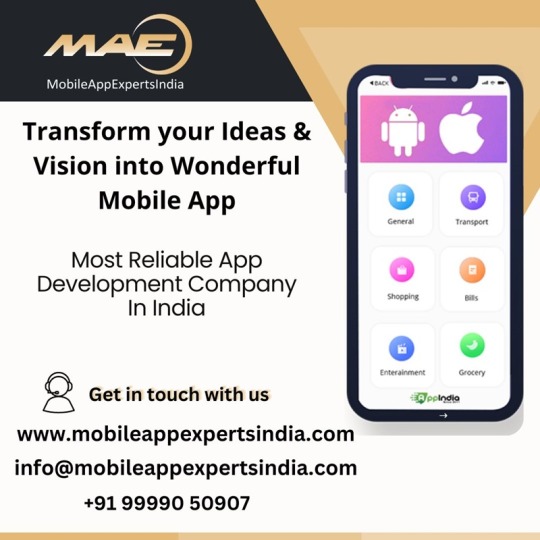
#mobile app development#mobile application development#hybrid app development services#mobile app development company#android app development india
0 notes
Text
Ionic vs NativeScript-Is Ionic Truly Untouchable or Skipping on NativeScript?

Before we start the debate of Ionic vs Nativescript, let me clear the air of what’s what.
What’s Ionic?
Ionic, a powerful mobile framework that aids you with building native-like-feeling mobile apps with technologies as HTML, CSS & JS. HTML5 SDK that helps you build using web technologies like HTML, CSS, and JavaScript. Ionic is focused mainly on the look and feel, and UI interaction of your app. That means we aren’t a replacement for PhoneGap or your favorite JavaScript framework. Is Ionic truly untouchable, or are we skipping on NativeScript?
What’s NativeScript?
NativeScript, an open-source framework for developing apps solely for iOS/Android platforms. In other words, rather than the native-like-feel you get the full experience.
Now that we have set this aside, let’s get into what really sets them apart.
Ionic vs NativeScript
1. Development Speed
2. UI
3. Performance
Development speed
Coding in Ionic is comparatively faster and a lot less tiring. Constructed on top of Angular and built using Apache Cordova, Ionic stands out in hybrid application services, without requiring custom technologies.
However, coding in NativeScript comparatively takes more time. Being a transpiling language, that uses JavaScript, the options seem limited.
UI
When considering performance, Ionic is not suitable for application with complex tasks since it runs on WebView. On the other hand, NativeScript comes off as a one-piece process.
Performance
UI/X has taken over this past few years by storm as we know it. However, both Ionic and NativeScript support them, yet NativeScript comes out top in this due to its seamlessness and rich UI supplement. (Looking to perfect your mobile application UI/X design, check this out)
Ionic comes with UI components for a native-like UI experience. NativeScript uses XML based UI designing and styling through CSS. The component library is built on top of native control for a seamless UI experience compared to that of Ionic.
Ionic vs Native – An overview
What sets them apart?
The key difference is that Ionic requires additional plugins to access system features however, Native doesn’t require this as it has access to the whole API.
Who can benefit from Ionic?
Anyone who is set to develop hybrid mobile apps using CSS, HTML5 or Web platform technology.
Who can benefit from NativeScript?
Anyone who intends to develop an Android or iOS using JavaScript, by sharing the code across platforms.
Wrap up
Wrapping up, I want to make it clear that I am not debating that one is better than the other. To be more precise, when you are in need of creating an application within a limited timeline, that supports both mobile and web browser Ionic should be your means. However, if you want your application to handle complex tasks and your primary goal is performance then opt for NativeScript.
#Ionic#NativeScript#MobileAppDevelopment#HybridApps#UI#Performance#DevelopmentSpeed#WebView#JavaScript#AppDevelopment#MobileFrameworks#Angular#ApacheCordova#NativeExperience#UIComponents#CrossPlatformDevelopment
0 notes
Text
Custom AI Development Services - Grow Your Business Potential

AI Development Company
As a reputable Artificial Intelligence Development Company, Bizvertex provides creative AI Development Solutions for organizations using our experience in AI app development. Our expert AI developers provide customized solutions to meet the specific needs of various sectors, such as intelligent chatbots, predictive analytics, and machine learning algorithms. Our custom AI development services are intended to empower your organization and produce meaningful results as it embarks on its digital transformation path.
AI Development Services That We Offer
Our AI development services are known to unlock the potential of vast amounts of data for driving tangible business results. Being a well-established AI solution provider, we specialize in leveraging the power of AI to transform raw data into actionable insights, paving the way for operational efficiency and enhanced decision-making. Here are our reliably intelligent AI Services that we convert your vision into reality.
Generative AI
Smart AI Assistants and Chatbot
AI/ML Strategy Consulting
AI Chatbot Development
PoC and MVP Development
Recommendation Engines
AI Security
AI Design
AIOps
AI-as-a-Service
Automation Solutions
Predictive Modeling
Data Science Consulting
Unlock Strategic Growth for Your Business With Our AI Know-how
Machine Learning
We use machine learning methods to enable sophisticated data analysis and prediction capabilities. This enables us to create solutions such as recommendation engines and predictive maintenance tools.
Deep Learning
We use deep learning techniques to develop effective solutions for complex data analysis tasks like sentiment analysis and language translation.
Predictive Analytics
We use statistical algorithms and machine learning approaches to create solutions that predict future trends and behaviours, allowing organisations to make informed strategic decisions.
Natural Language Processing
Our NLP knowledge enables us to create sentiment analysis, language translation, and other systems that efficiently process and analyse human language data.
Data Science
Bizvertex's data science skills include data cleansing, analysis, and interpretation, resulting in significant insights that drive informed decision-making and corporate strategy.
Computer Vision
Our computer vision expertise enables the extraction, analysis, and comprehension of visual information from photos or videos, which powers a wide range of applications across industries.
Industries Where Our AI Development Services Excel
Healthcare
Banking and Finance
Restaurant
eCommerce
Supply Chain and Logistics
Insurance
Social Networking
Games and Sports
Travel
Aviation
Real Estate
Education
On-Demand
Entertainment
Government
Agriculture
Manufacturing
Automotive
AI Models We Have Expertise In
GPT-4o
Llama-3
PaLM-2
Claude
DALL.E 2
Whisper
Stable Diffusion
Phi-2
Google Gemini
Vicuna
Mistral
Bloom-560m
Custom Artificial Intelligence Solutions That We Offer
We specialise in designing innovative artificial intelligence (AI) solutions that are tailored to your specific business objectives. We provide the following solutions.
Personlization
Enhanced Security
Optimized Operations
Decision Support Systems
Product Development
Tech Stack That We Using For AI Development
Languages
Scala
Java
Golang
Python
C++
Mobility
Android
iOS
Cross Platform
Python
Windows
Frameworks
Node JS
Angular JS
Vue.JS
React JS
Cloud
AWS
Microsoft Azure
Google Cloud
Thing Worx
C++
SDK
Kotlin
Ionic
Xamarin
React Native
Hardware
Raspberry
Arduino
BeagleBone
OCR
Tesseract
TensorFlow
Copyfish
ABBYY Finereader
OCR.Space
Go
Data
Apache Hadoop
Apache Kafka
OpenTSDB
Elasticsearch
NLP
Wit.ai
Dialogflow
Amazon Lex
Luis
Watson Assistant
Why Choose Bizvertex for AI Development?
Bizvertex the leading AI Development Company that provides unique AI solutions to help businesses increase their performance and efficiency by automating business processes. We provide future-proof AI solutions and fine-tuned AI models that are tailored to your specific business objectives, allowing you to accelerate AI adoption while lowering ongoing tuning expenses.
As a leading AI solutions provider, our major objective is to fulfill our customers' business visions through cutting-edge AI services tailored to a variety of business specializations. Hire AI developers from Bizvertex, which provides turnkey AI solutions and better ideas for your business challenges.
#AI Development#AI Development Services#Custom AI Development Services#AI Development Company#AI Development Service Provider#AI Development Solutions
0 notes
Text
Hire Angular Developers in India: The Smart Choice for Building Dynamic Web Applications 🚀💻
In today’s fast-paced digital world, delivering high-quality, dynamic, and responsive web applications is essential for staying ahead of the competition. One of the most popular frameworks for building scalable and interactive web applications is Angular. Developed and maintained by Google, Angular is a powerful open-source front-end framework that allows developers to create seamless, high-performing applications.
When it comes to hiring Angular developers, India stands out as a prime destination. With a large pool of skilled professionals, cost-effective solutions, and a growing tech ecosystem, India has become the go-to choice for businesses looking to build robust web applications. This article explores why you should hire Angular developers in India, the benefits they offer, and how to choose the right developer for your project.
1️⃣ Why Choose Angular for Web Application Development?
Before we dive into the reasons why hiring Angular developers in India is a smart move, let’s understand why Angular is a preferred framework for web development.
⚡ Fast and Efficient Performance
Angular’s two-way data binding allows for faster development and reduces the amount of boilerplate code developers need to write. It ensures that your app runs smoothly, even as it scales, thanks to its component-based architecture and efficient rendering.
🌍 Cross-Platform Compatibility
Angular enables the creation of progressive web apps (PWAs) and mobile apps using frameworks like Ionic, ensuring a consistent user experience across various platforms, including mobile and desktop.
📦 Scalable and Maintainable
Angular’s modular structure and use of TypeScript make it easier for developers to scale applications and maintain them over time. The framework’s dependency injection and component-based design allow for easier testing and future updates.
🔧 Extensive Ecosystem
Angular comes with a rich set of tools and libraries, including Angular CLI, RxJS for reactive programming, and built-in directives that make development faster and more efficient.
2️⃣ Why Hire Angular Developers in India?
Hiring Angular developers in India has become a top choice for businesses worldwide. Here are some compelling reasons why India is the perfect destination to find skilled Angular developers:
💰 Cost-Effective Solutions
India offers high-quality development services at competitive rates. By hiring Angular developers in India, you can save significantly on development costs while still receiving top-notch service and high-quality code.
🧠 Highly Skilled Developers
India is home to a large pool of skilled developers who are proficient in Angular and other technologies. Many Indian developers have been trained in top engineering institutions and possess in-depth knowledge of both the Angular framework and the underlying JavaScript technologies.
🌍 Time Zone Advantage
Indian developers can work around the clock and offer flexible working hours to accommodate time zone differences. This ensures faster turnaround times and 24/7 project support, especially for businesses based in other regions.
🚀 Proven Track Record
India has successfully delivered thousands of Angular-based projects across industries such as healthcare, finance, e-commerce, and entertainment. Indian developers have the expertise to handle projects of any complexity and deliver results that meet global standards.
📈 Access to a Large Talent Pool
With millions of developers skilled in Angular and other related technologies, you have a vast pool of talent to choose from in India. This makes it easier to find developers with the specific skills you need for your project.
3️⃣ Services Offered by Angular Developers in India
Hiring Angular developers in India can give you access to a wide range of development services that can take your web application to the next level:
1. Custom Web Application Development
Indian Angular developers specialize in building custom web applications that are tailored to meet your business needs. Whether it’s a simple website or a complex enterprise application, they can create a solution that drives growth.
2. Enterprise Application Development
Angular is perfect for building large-scale, enterprise-level applications. Indian developers have the experience and skills to create secure, scalable, and highly efficient enterprise applications that help streamline operations.
3. Single Page Application (SPA) Development
Angular is the go-to framework for building single-page applications (SPAs) that offer seamless navigation and improved performance. Indian Angular developers can create SPAs that provide a fast and responsive user experience.
4. Mobile App Development
With Angular’s ability to integrate with frameworks like Ionic, Indian developers can build mobile applications for both Android and iOS platforms, all from a single codebase.
5. Maintenance and Support
Hiring Angular developers in India also means you get ongoing maintenance and support to ensure that your application stays up-to-date, secure, and efficient.
4️⃣ Key Benefits of Hiring Angular Developers in India
🌟 Expertise in Latest Angular Versions
Indian developers are well-versed in the latest versions of Angular, ensuring that your web applications leverage the best features and performance enhancements that Angular has to offer.
🌟 Quick Development Cycles
Thanks to their experience and familiarity with Angular, Indian developers can speed up development cycles, ensuring that your project is delivered on time and within budget.
🌟 Quality Assurance and Testing
Indian developers follow rigorous testing processes to ensure that your application is free of bugs, secure, and performs optimally across all devices and browsers.
🌟 Custom Solutions for Your Business
Angular developers in India provide solutions that are tailor-made to meet your specific business objectives. They work closely with you to understand your requirements and deliver a product that aligns with your vision.
🌟 Effective Communication and Collaboration
Indian Angular developers are fluent in English, which makes communication smooth and easy. This is essential for ensuring that your project requirements are well understood and that you’re kept in the loop at every stage of development.
5️⃣ How to Hire Angular Developers in India
Finding the right Angular developer in India for your project requires a structured approach. Here’s a step-by-step guide to hiring the perfect developer:
Step 1: Define Your Project Scope
Before you begin your search for Angular developers, outline your project’s requirements, goals, and expected outcomes. This will help you identify the right skill set and expertise needed for the job.
Step 2: Research Potential Candidates
Look for developers or agencies with a strong portfolio and experience in Angular development. Platforms like Upwork, Toptal, and LinkedIn are great places to find skilled professionals.
Step 3: Evaluate Their Technical Skills
Make sure the developers are proficient in Angular, TypeScript, HTML5, CSS3, and other relevant technologies. Check their portfolio to see if they have experience with projects similar to yours.
Step 4: Conduct Interviews
Interview potential candidates to assess their communication skills, problem-solving abilities, and understanding of your project’s requirements.
Step 5: Start with a Trial Project
Consider assigning a small test project to evaluate their capabilities before committing to a long-term contract.
6️⃣ Frequently Asked Questions
Q1: How much does it cost to hire Angular developers in India?
The cost varies depending on the developer’s experience and the complexity of the project. On average, the rates range from $15 to $40 per hour.
Q2: How long does it take to develop a web application with Angular?
The timeline depends on the scope and complexity of the project. Small to medium-sized applications may take 3 to 6 months, while larger projects can take longer.
Q3: What industries benefit from Angular development?
Angular is ideal for industries such as e-commerce, healthcare, finance, education, and entertainment, as it offers scalability, security, and performance for both web and mobile applications.
Conclusion: Hire Angular Developers in India for Future-Proof Web Solutions
Hiring Angular developers in India is a smart move for businesses looking to create high-performance, dynamic, and scalable web applications. With a vast talent pool, cost-effective solutions, and a proven track record of successful projects, India has become a leading destination for businesses seeking top-notch Angular development.
💡 Ready to take your web development to the next level? Hire Angular developers in India today and unlock endless possibilities for your business! 🚀
0 notes
Text
PVDF Membrane Market: Innovations and Applications in Biopharmaceutical, Industrial, and Food & Beverage Sectors

Polyvinylidene fluoride (PVDF) membranes are revolutionizing key industries, finding critical applications in biopharmaceuticals, industrial processes, and food and beverage production. These membranes, celebrated for their superior chemical resistance, thermal stability, and mechanical strength, are indispensable for advanced filtration and separation technologies that underpin modern manufacturing and production standards.
PVDF Membranes: A Closer Look
PVDF Membrane Market Size is projected to grow from USD 779 million in 2022 to USD 1,126 million by 2027, at a CAGR of 7.7% between 2022 and 2027. PVDF, a semi-crystalline thermoplastic fluoropolymer, boasts a unique combination of properties tailored for high-performance applications. Its high purity and exceptional resistance to gas and liquid permeation are especially critical for industries requiring stringent contamination control. PVDF can withstand temperatures up to 150°C and demonstrates resistance to a broad spectrum of chemicals, further solidifying its role in challenging operational environments.
In the biopharmaceutical sector, PVDF membranes are indispensable for processes like microfiltration and ultrafiltration. These membranes are pivotal in the purification of biologics, effectively removing contaminants such as bacteria, viruses, and particulates. Furthermore, their high protein binding capacity makes them ideal for sensitive biomolecular applications, where preserving product integrity is paramount.
Applications in Industrial Processes
Industries rely on PVDF membranes for their durability, versatility, and performance. In wastewater treatment, these membranes excel in removing suspended solids and organic pollutants, contributing to more sustainable water management practices. Their chemical resilience makes them well-suited for demanding sectors such as petrochemicals and pharmaceuticals.
The energy sector, particularly in fuel cell technology, also benefits from PVDF membranes. Their ionic conductivity and mechanical properties enhance fuel cell efficiency and lifespan, aligning with the growing global emphasis on renewable energy solutions. As the demand for clean energy grows, PVDF's role in supporting innovative technologies becomes increasingly significant.
Transformations in Food & Beverage Processing
In the food and beverage industry, PVDF membranes are reshaping traditional practices by offering high-performance filtration solutions. These membranes are used in applications like wine clarification and juice concentration, where their ability to operate across diverse pH levels and temperatures ensures consistent product quality. Additionally, PVDF’s inert nature addresses safety concerns, ensuring no harmful substances leach into consumables.
Recent advancements in PVDF membrane technology have led to improved productivity and reduced operational costs. Enhanced surface modification techniques, for instance, have significantly increased resistance to fouling, extending the service life of membranes while reducing maintenance requirements. These innovations not only improve efficiency but also align with sustainability goals by cutting down waste and resource consumption.
Market Trends and Future Prospects
The PVDF membrane market is on a robust growth trajectory, driven by increasing demand across diverse industries. Biopharmaceuticals, industrial manufacturing, and food processing are witnessing a rising preference for PVDF due to its unparalleled performance characteristics. Moreover, global emphasis on clean production methods and regulatory compliance is accelerating adoption.
Future advancements in PVDF technology, such as enhanced permeability and selectivity, are set to unlock new applications. Hybrid membranes that combine PVDF with complementary materials are also being explored, promising greater performance and efficiency.
To know more Download PDF Brochure :
PVDF membranes are playing a transformative role in key industries, thanks to their ability to meet stringent performance, safety, and sustainability demands. As advancements in PVDF technology continue, their applications are expected to expand, offering solutions to ever-evolving industrial challenges. For businesses across biopharmaceuticals, industrial manufacturing, and food and beverage sectors, staying ahead of these innovations is essential to harness the full potential of this versatile material.
PVDF membranes are not just a material of the present but a cornerstone for future industrial advancements. Industry professionals who leverage their capabilities will be well-positioned to drive efficiency, innovation, and sustainability in their respective fields.
#PVDF Membrane Market#Filtration Technology#Biopharmaceutical Applications#Industrial Filtration#Sustainable Manufacturing#Food and Beverage Processing#Membrane Innovations
0 notes